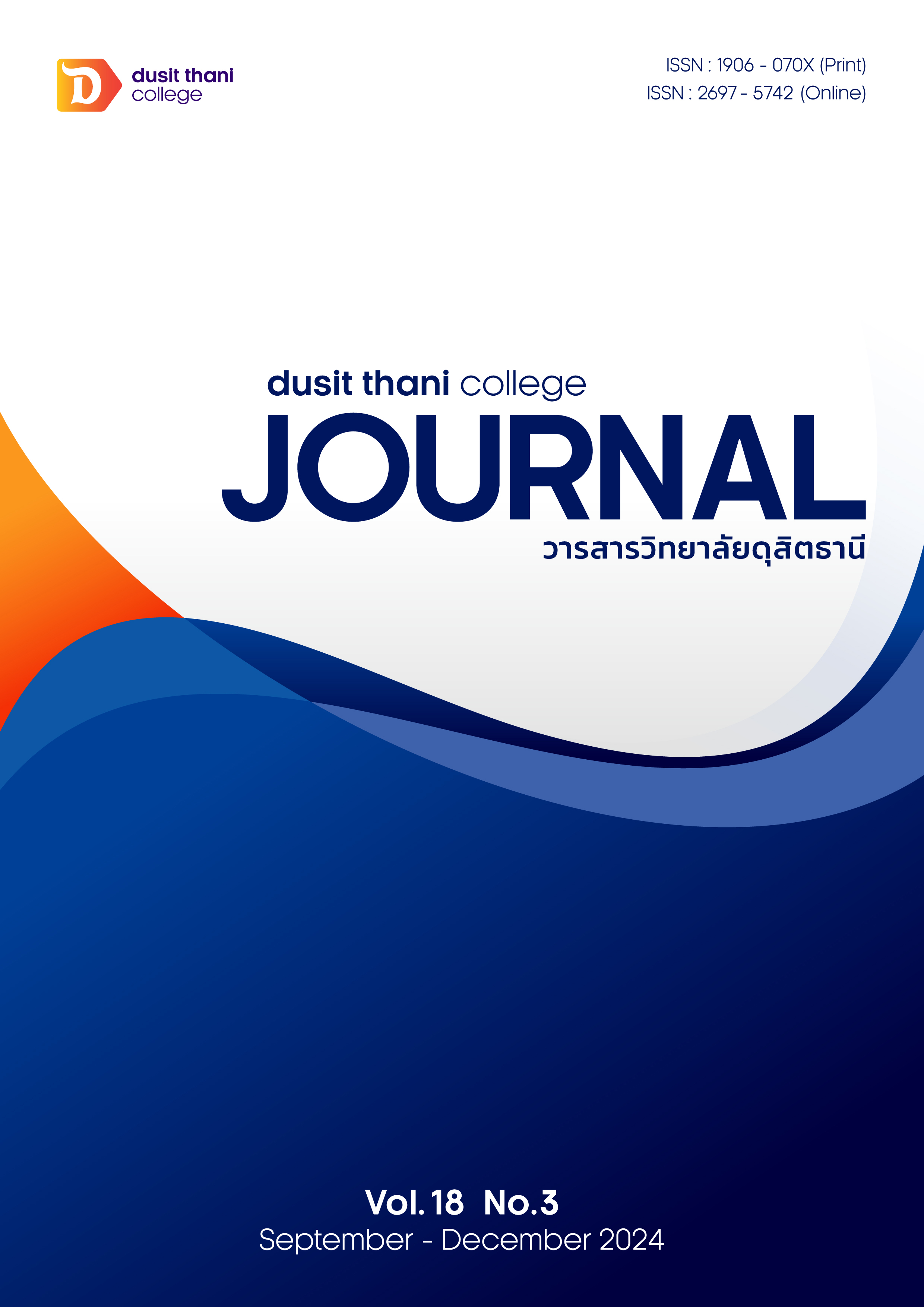อิทธิพลของความสามารถเชิงพลวัตและคุณภาพการให้บริการด้านโลจิสติกส์กับศักยภาพ การดำเนินงานของธุรกิจการจัดจำหน่ายอุปกรณ์ทางการกีฬาในประเทศไทย
Main Article Content
บทคัดย่อ
การวิจัยครั้งนี้มีวัตถุประสงค์เพื่อพัฒนารูปแบบความสัมพันธ์เชิงสาเหตุของความสามารถเชิงพลวัตและคุณภาพการให้บริการด้านโลจิสติกส์กับศักยภาพการดำเนินงานของธุรกิจการจัดจำหน่ายอุปกรณ์ทางการกีฬาในประเทศไทย โดยการศึกษาครั้งนี้เป็นการวิจัยเชิงปริมาณ โดยได้ทำการเก็บรวบรวมข้อมูลจากแบบสอบถามจากธุรกิจการจัดจำหน่ายอุปกรณ์ทางการกีฬาในประเทศไทย ที่เป็นสถานประกอบการธุรกิจการจัดจำหน่ายอุปกรณ์ทางการกีฬาที่มีการจดทะเบียนกับกรมพัฒนาธุรกิจ ปี พ.ศ. 2565 จำนวน 476 แห่ง และทำการวิเคราะห์ข้อมูลด้วยโมเดลสมการโครงสร้าง (Structural Equation Model: SEM)
ผลการวิจัยพบว่า รูปแบบความสัมพันธ์เชิงสาเหตุความสามารถเชิงพลวัตมีอิทธิพลทั้งทางตรงและทางอ้อมต่อศักยภาพการดำเนินงานของธุรกิจการจัดจำหน่ายอุปกรณ์ทางการกีฬาในประเทศไทย อย่างมีนัยสำคัญทางสถิติ โดยอิทธิพลทางอ้อมนั้นมีคุณภาพการให้บริการ ด้าน
โลจิสติกส์ของธุรกิจเป็นตัวคั่นกลาง เมื่อพิจารณาองค์ประกอบความสามารถเชิงพลวัตแล้วพบว่า ธุรกิจควรให้ความสำคัญการสร้างและพัฒนาความสามารถในการแสวงหาความรู้ ความสามารถใน
การปรับตัว และความสามารถในการสร้างนวัตกรรมโดยนำเอาคุณภาพการให้บริการด้านโลจิสติกส์ของธุรกิจมาเป็นเกณฑ์ในการสร้างและพัฒนา และต้องมีการวางแผนและควบคุมการการให้บริการ การตอบสนองลูกค้า การจัดส่งสินค้าที่ตรงตามเวลา และการขนส่งสินค้าไม่ให้เกิดความเสียหายเพื่อจะนำไปสู่การเพิ่มขึ้นของความคุณภาพการให้บริการที่เหนือกว่าคู่แข่งขัน นอกจากนี้ผลการวิจัยยังพบอีกว่า คุณภาพการให้บริการด้านโลจิสติกส์มีอิทธิพลทางตรงต่อศักยภาพการดำเนินงานของธุรกิจอย่างมีนัยสำคัญทางสถิติ ดังนั้นองค์กรใด ๆ ที่ต้องการเพิ่มโอกาสของความสามารถทางการแข่งขันให้เกิดขึ้นกับธุรกิจ องค์กรนั้นย่อมต้องให้ความสำคัญต่อความสามารถ เชิงพลวัตและคุณภาพการให้บริการด้านโลจิสติกส์เพื่อช่วยให้ธุรกิจสามารถปรับตัวเข้ากับสิ่งแวดล้อมทางการแข่งขันที่มีการเปลี่ยนแปลงอย่างรวดเร็วได้
Article Details

อนุญาตภายใต้เงื่อนไข Creative Commons Attribution-NonCommercial-NoDerivatives 4.0 International License.
นโยบายการพิจารณากลั่นกรองบทความ
- บทความวิจัยและบทความวิชาการทุกเรื่องที่จะได้รับการตีพิมพ์ต้องผ่านการพิจารณากลั่นกรองโดยผู้ทรงคุณวุฒิ (Peer Review) ในสาขาที่เกี่ยวข้อง จำนวน 3 ท่าน/บทความ
- บทความ ข้อความ ภาพประกอบและตารางประกอบที่ลงตีพิมพ์ในวารสารเป็นความคิดเห็นส่วนตัวของผู้เขียน กองบรรณาธิการไม่จำเป็นต้องเห็นด้วยเสมอไป และไม่มีส่วนรับผิดชอบใด ๆ ถือเป็นความรับผิดชอบของผู้เขียนแต่เพียงผู้เดียว
- บทความที่จะได้รับการตีพิมพ์จะต้องไม่เคยตีพิมพ์ เผยแพร่ที่ใดมาก่อน และไม่อยู่ระหว่างการพิจารณาของวารสารฉบับอื่น หากตรวจสอบพบว่ามีการตีพิมพ์ซ้ำซ้อน ถือเป็นความรับผิดชอบของผู้เขียนแต่เพียงผู้เดียว
- บทความใดที่ผู้อ่านเห็นว่าได้มีการลอกเลียนหรือแอบอ้างโดยปราศจากการอ้างอิง หรือทำให้เข้าใจผิดว่าเป็นผลงานของผู้เขียน กรุณาแจ้งให้กองบรรณาธิการวารสารทราบจะเป็นพระคุณยิ่ง
เอกสารอ้างอิง
Bank of Ayudhya. (2022). Thailand business trend in 2022-2024. Retrieved from https://www.krungsri.com/
th/research/Industry/summary-outlook/outlook-2022-2024
Chumpitaz, R., & Paparoidamis, N. G. (2004). Service quality and marketing performance in business-to-business markets: Exploring the mediating role of client satisfaction. Managing Service Quality, 14(2-3), 235–248. https://doi.org/10.1108/09604520410528653
Department of Business Development. (2022). Thailand Business Data Warehouse. Retrieved form https://datawarehouse.dbd.go.th/index
Hair, J. F., Black, W. C., Babin, B. J., & Anderson, R. E. (2010). Multivariate data analysis (7th ed.). Upper Saddle River, NJ: Pearson Prentice Hall.
Jichang, Z., Jing, L. and Feng, C. (2023). Big Data Capability, Knowledge Dynamic Capability, and Business Model Innovation: The Moderating Effect of Innovation Legitimacy. Frontiers of Business Research in China, 17(4), p520-541. 22p. DOI: 10.3868/s070-008-023-0032-7.
Jomthanachai, S., Wong, W. and Khaw, K. (2024). An Application of Machine Learning to Logistics Performance Prediction: An Economics Attribute-Based of Collective Instance. Computational Economics, 63(2):741-792
Krissamaporn, P. and Sawat, W. (2019). A Structural Equation Model for Logistics Service Quality to Measurement Passenger Loyalty at Suvarnabhumi Airport, Thailand. PSAKU International Journal of Interdisciplinary Research, 6(1), 79-91.
Milos, D. (2022). The Influence of the Quality of Logistics Services on User Satisfaction in Serbia. ODITOR -Journal for Management, Finance and Law, 2, pp. 109-138.
Parasuraman, A., Zeithaml, V. A., & Malhotra, A. (2005). “E-S-QUAL - A multiple-item scale for assessing electronic service quality”. Journal of Service Research, 7(3) : 213-233.
Patale, P. and Zohair, M. (2021). Impact of Covid-19 Pandemic on Reverse Supply Chain of Electronic Commerce. The International journal of analytical and experimental modal analysis, 8(2), 53-59.
Sabilla, A., Arum, C., Alfaridi, N. and Simarmata, J. (2023). LOGISTIC SERVICE QUALITY (LSQ) ON SHOPEEXPRESS. Malaysian Journal of Computing, 8(2), Pp 1472-1481.
Teece, D. J. (2014). The Foundations of Enterprise Performance: Dynamic And Ordinary Capabilities in an (Economic) Theory of Firms. The Academy of Management Perspectives, 28(4), 328-352.
Thanaiudompat, T. (2023). The Brand Values Development from The Customer’s Perspective in Sports Apparel Business in Thailand. Interdisciplinary Research Review, 18(2), 18-26. Retrieved from https://ph02.tci-thaijo.org/index.php/jtir/article/view/248712
Wang, H., Huang, M., Wang, H. and Zhou, Y. (2023). Fourth party logistics service quality management with logistics audit. Journal of Industrial & Management Optimization, 19 (10), p1-25. 25p. DOI: 10.3934/jimo.2022254.
Zhang, Y., Long, J. and Zhao, W. (2022). Building dynamic capabilities of small and medium-sized enterprises through relational embeddedness: evidence from China. Electronic Commerce Research, 23(4):2859-2906.


